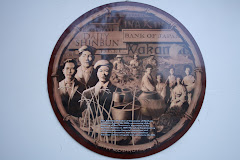There is more than a century of Japantown history through which residents there view the present. This fact confronted me like a tidal wave as I stumbled through my first attempts at interviewing. After talking with people, it became clear that every current struggle or triumph in the neighborhood is linked to the past.
In the short time I've been covering Japantown the Better Neighborhood Plan has stalled, the renovation of the Japan Center has continued to loom and may destroy small businesses, New People opened, and both Japanese-American newspapers based in the neighborhood have folded.
The fabric of the neighborhood appears to be coming apart at the seams. But after talking with people for just three months, I've realized that if the future of the neighborhood was secure, that would be considered out of the norm. The whole history of Japantown is defined by a rugged struggle for survival, and it's inescapable during conversation about the current state of the community. I've simply caught a glimpse of these tireless efforts since August.
A Beverly Hills investment company bought the economic core of the neighborhood in 2006, and residents are fighting to protect their future through the Better Neighborhood Plan, which already been more than a two-year affair.
The 60-year-old Hokubei Mainichi folded Oct. 30, and former senior editor J.K. Yamamoto continues to update the Website everyday, despite not being paid.
The Nichi Bei Times folded in September and former employees launched the Nichi Bei Foundation, which produces a weekly paper, to keep citizens informed. They, too, are working without pay. Kenji Taguma, president of the Nichi Bei Foundation, told me a story about his 6-year-old niece giving him a $6 donation to help continue publishing the weekly paper.
"It would have been easier to quit," Taguma said.
For me, that statement is tailor-made for Japantown. After internment during World War II, it would have been easier to quit, but residents didn't. They returned and rebuilt Japantown. After the 1950's and 60's redevelopment, which razed houses and cut the neighborhood in half with an 8-lane Geary Boulevard, it would have been easier to quit. They didn't.
The upcoming renovation of the Japan Center could be a third displacement, but residents are still not quitting.
I'm privileged to have had the experience of reporting on Japantown, and I'm astonished by what I learned in such a short amount of time. I dreaded approaching people and asking them questions three months ago. I now feel confident walking up to anyone or into any building and getting answers. And I learned that in Japantown.




No comments:
Post a Comment